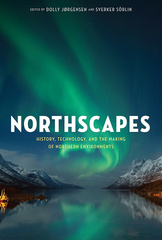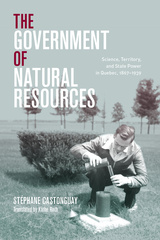Our shopping cart is currently down. To place an order, please contact our distributor, UTP Distribution, directly at utpbooks@utpress.utoronto.ca.

Power from the North
Territory, Identity, and the Culture of Hydroelectricity in Quebec
In the 1970s, Hydro-Québec declared in a publicity campaign “We Are Hydro-Québécois.” The slogan symbolized the extent to which hydroelectric development in the North had come to both reflect and fuel French Canada’s aspirations in the South. The slogan helped southerners relate to the province’s northern territory and to accept the exploitation of its resources.
In Power from the North, Caroline Desbiens explores how this culture of hydroelectricity helped shape the material landscape during the first phase of the James Bay hydroelectric project. She analyzes the cultural forces that contributed to the transformation of the La Grande River into a hydroelectric complex. Policy makers and Quebecers did not, she argues, view those who built the dams as mere workers – they saw them as pioneers in a previously uninhabited landscape now inscribed with the codes of culture and spectacle.
This dynamic book reveals that drawing power from the North involves not only the cultural erasure of Aboriginal homelands but also rewriting the region’s history in the language of identity and territoriality. To reverse this trend, Desbiens calls for a truly sustainable resource management, one in which all actors bring an awareness of their own cultural histories and visions of nature, North, and nation to the negotiating table.
Power from the North will appeal to geographers, historians, policy makers, and environmentalists and anyone interested in First Nations, resource co-management, and cultural approaches to energy.
Awards
- 2015, Shortlisted - Canada Prize in the Social Sciences, Federation for the Humanities and Social Sciences
Caroline Desbiens explores the nexus of hydroelectricity, Québécois identity, and the cultural narratives that are used by southern Québécois to justify resource development in the northern regions of the province. The result is a wonderfully personal and critical reflection on the culture of hydroelectricity in Québec and ‘the importance of reading economic development through a cultural lens.’ [It] is an excellent new contribution to the Nature|History|Society series from UBC Press. It connects beautifully with the other books in the series and will compliment work on the ways in which people conceptualize and transform the north through material, and particularly discursive, formations.
As society struggles to find a balance between economic security and environmental well-being and grapples with the various challenges posed by social and environmental injustices, the freighted implications of popular ideas of the North need to be better understood. Power from the North can and should help with this.
Power from the North is a much-needed reinterpretation of Quebec’s relationship with its north. Desbiens’s sophisticated critique of nationalist, heroic narratives inherent in the earlier James Bay projects argues persuasively that development has been both an aspect of the modern technocratic state and a troubling legacy of colonialism in Quebec. This timely historical geography speaks directly to this legacy, as well as to current political rhetoric about the North.
Foreword: Ideas of North / Graeme Wynn
Introduction: Looking North
Part 1: Power and the North
1 The Nexus of Hydroelectricity in Quebec
2 Discovering a New World: James Bay as Eeyou Istchee
Part 2: Writing the Land
3 Who Shall Convert the Wilderness into a Flourishing Country?
4 From the Roman de la Terre to the Roman des Ressources
Part 3: Rewriting the Land
5 Pioneers
6 Workers
7 Spectators
Conclusion: Ongoing Stories and Powers from the North
Notes
Selected Bibliography
Index













